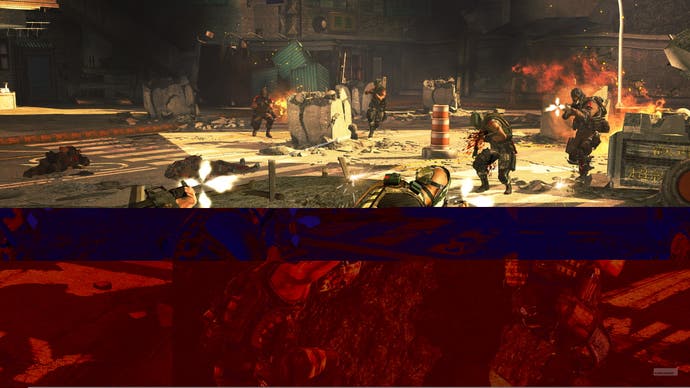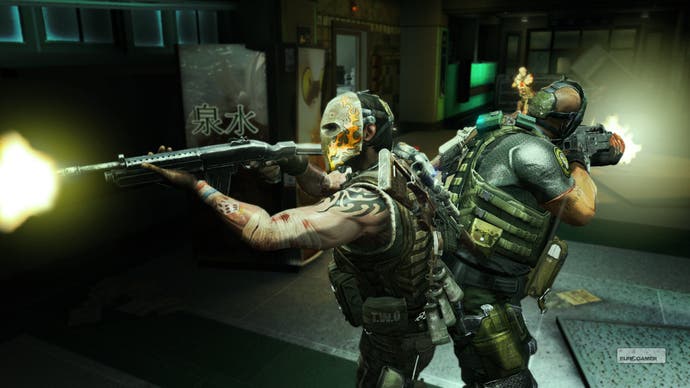Army of Two: The 40th Day
Flanks a lot.
Of course, this does mean that the moments when the AI stumbles are more noticeable and problematic. You can come to rely so much on the partner character that for him to suddenly develop a death wish and stand in an open doorway, blasting randomly and forcing you to make your way to his location to save him, really mucks up your game. It's more problematic when confronted by one of the game's many hostage situations, where you come across civilians held at gunpoint by the enemy mercenary army.
Saving these hapless souls isn't essential, but it does result in sizable cash bonuses as well as access to new weapon parts. Trouble is, trying to pull off such tricky extractions with the partner AI is like performing keyhole surgery while wearing mittens - you can only get so far before the lack of sensory feedback makes it a right old fumble. In one such situation, I painstakingly sniped a guard, crept beneath a window and was about to quietly open a door to grab a commanding officer as collateral, when my partner, in direct contradiction to his defensive stance, simply strode up to the window and started shooting.
But of course, the idea is that you're playing with another human, with whom you can coordinate such things. Later hostage encounters, however, seem insurmountable even for the best flesh and blood operatives. While the attempt is welcome, Army of Two just doesn't suit these quasi-stealth moments, and while they are optional, so it's not a game-breaking problem, it also means there's no real incentive to grapple with the game's clumsy idea of subtlety.

It's here that the game starts to take steps backward. While the moment-to-moment gunplay is much better than it was in the 2008 model, the structure on the whole remains much the same, with lots of peripheral features and abilities that the game design never requires you to use let alone master. Weapon upgrades, for instance, are much less linear now - you can swap and change parts from any weapon in the same class to create your ideal hybrid arsenal - but although I tinkered and toyed with these options to see what they were like, my trusty default assault rifle was more than enough to tackle the vast majority of situations. The same is true of the more specialised co-op manoeuvres, like mock surrender. These can be a fun way to vary the experience, but are often no more effective than the basic suppress-and-flank pattern that works so well the majority of the time.
The token inclusion of moral choices also feels a bit uninspired. At set junctions in the story you have to make a snap decision regarding the fate of a character, and it generally boils down to kill or don't kill, and the repercussions of each choice are played out in stylish comic book panels. Sometimes there's an unforeseen twist in the tale, but apart from one moment where your past actions can prevent access to additional weaponry, there are no tangible consequences - and therefore no real point - to such interludes.

Much like its predecessor, The 40th Day only offers a rather short-lived campaign with little replay value. Seven chapters await you, a few of which are of decent size, but most are either too brief or generic to really register. My game clock stood at just over six hours by the end, but the slimline narrative makes it feel less substantial than that. The 40th Day's story only really comes into focus in the final level, and even then it doesn't begin to explain the constant slaughter and terrorist atrocity that has peppered the screen up until that point. That you're moving forwards, killing as you go, is presumably explanation enough.









